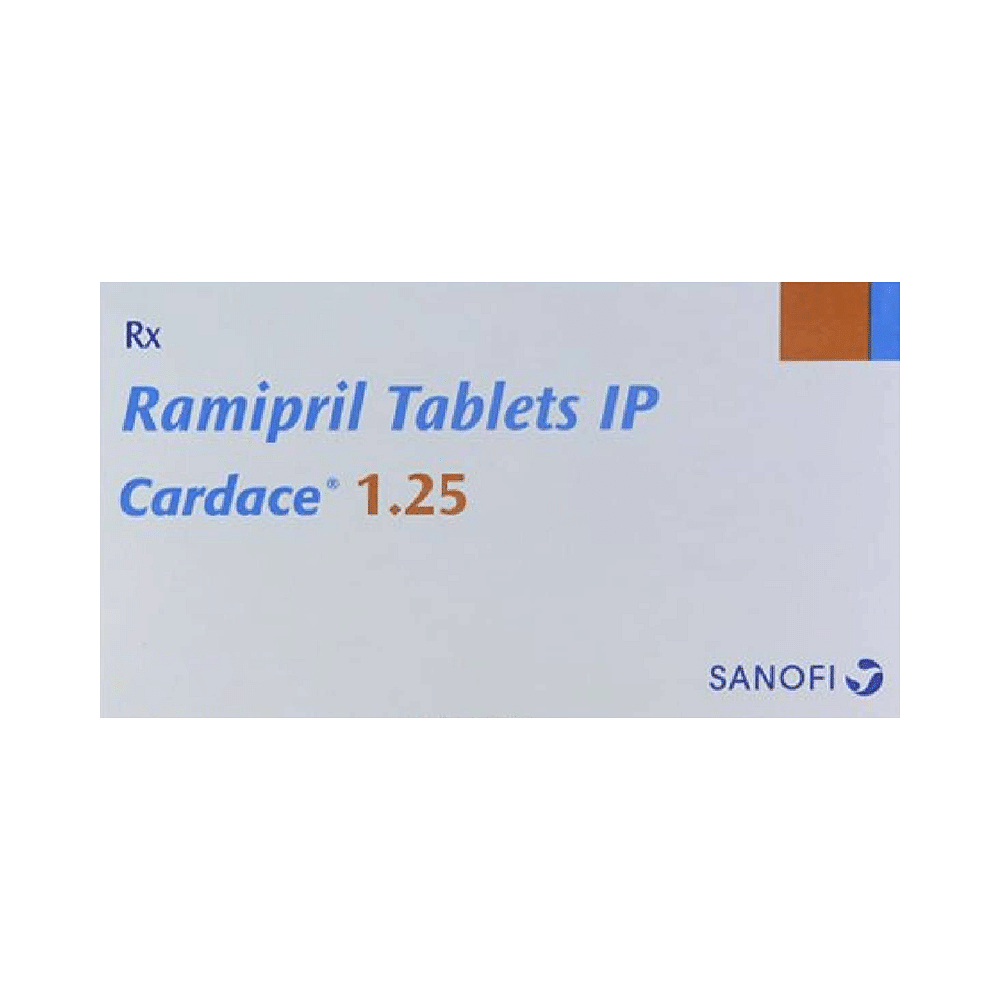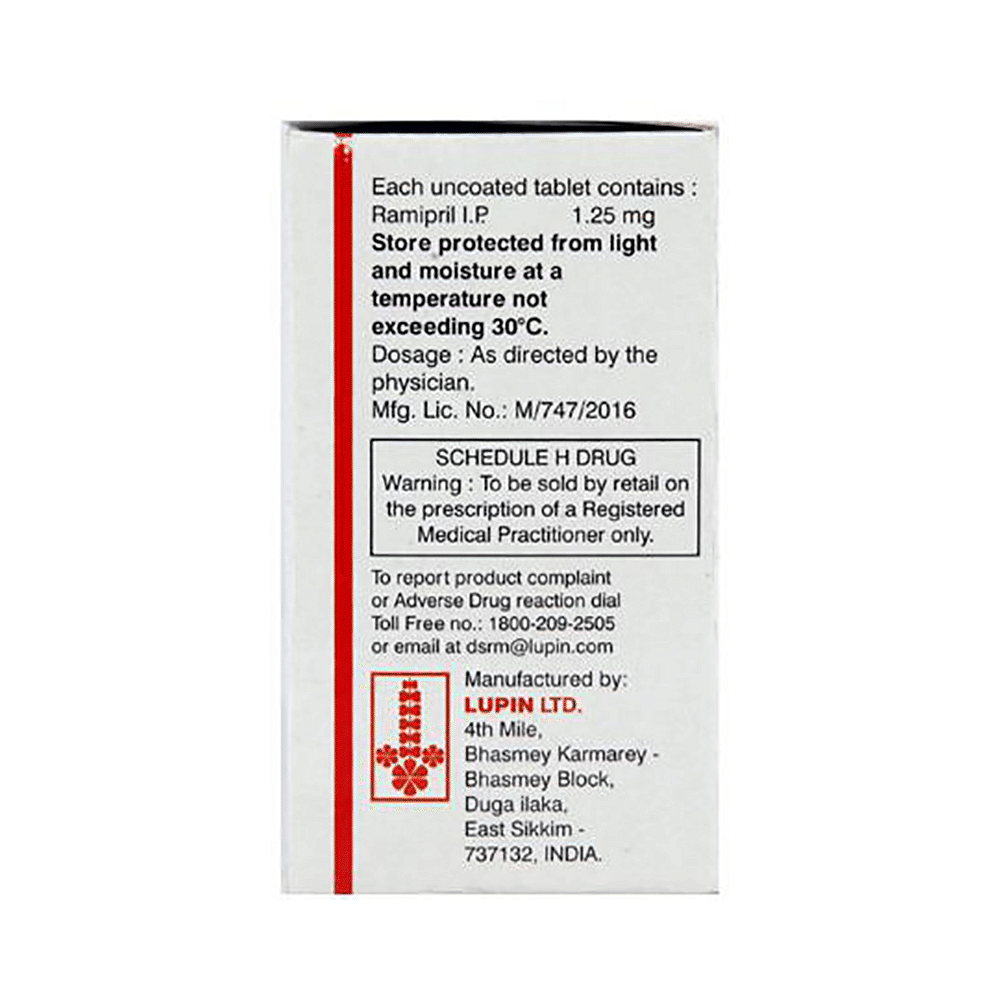
Zipril 1.25mg Tablet
Manufacturer
Vhb Life Sciences Inc
Salt Composition
Ramipril (1.25mg)
Key Information
Short Description
Zipril 1.25mg Tablet is widely used to treat high blood pressure and heart failure and may even be prescribed after a heart attack. It also lowers the chances of having a heart attack or stroke.
Dosage Form
Tablet
Introduction
Zipril 1.25mg Tablet may be prescribed either alone or in combination with other medicines. It can be taken on an empty stomach or with a meal. This medicine should preferably be taken at the same time each day to get the maximum benefit. It is important to continue taking it regularly even if you feel well or even if your blood pressure is controlled. Most people with high blood pressure do not feel any symptoms but if you stop taking this medicine your condition could get worse. This is a widely used medicine and is considered safe for long-term use. Making some changes in your lifestyle will also help lower your blood pressure. These may include regular exercise, losing weight, not smoking, reducing alcohol intake, and reducing the amount of salt in your diet as advised by your doctor.
Directions for Use
Take this medicine in the dose and duration as advised by your doctor. Swallow it as a whole. Do not chew, crush or break it. Zipril 1.25mg Tablet may be taken with or without food but it is better to take it at a fixed time.
Safety Information
Side Effects
No common side effects listed.
Alcohol Warning
Zipril 1.25mg Tablet may cause excessive drowsiness with alcohol.
Breastfeeding Warning
Zipril 1.25mg Tablet is probably unsafe to use during breastfeeding. Limited human data suggests that the drug may pass into the breastmilk and harm the baby.
Pregnancy Warning
Zipril 1.25mg Tablet is unsafe to use during pregnancy as there is definite evidence of risk to the developing baby. However, the doctor may rarely prescribe it in some life-threatening situations if the benefits are more than the potential risks. Please consult your doctor.
Interacting Medicines
Allopurinol Amiloride Azathioprine Bemiparin
How it works
Zipril 1.25mg Tablet is an angiotensin converting enzyme (ACE) inhibitor. It works by reducing stress on the heart and relaxing blood vessel so that blood flows more smoothly and the heart can pump blood more efficiently.
Quick Tips
Zipril 1.25mg Tablet can make you feel dizzy for the first few days so rise slowly if you have been sitting or lying down. You can also prefer taking it at bedtime to avoid dizziness throughout the day. Let your doctor know about any cough or throat irritation that does not go away. It may increase the level of potassium in blood. Avoid taking potassium supplements and potassium-rich foods such as banana and broccoli. Inform your doctor if you are pregnant, planning pregnancy or breastfeeding.
Related Medicines

Cardace 1.25 Tablet

Ramistar 1.25 Tablet

Macpril 1.25 Tablet

Ramsho 1.25mg Tablet

Dotace 1.25mg Tablet

Ramicon 1.25mg Tablet

Corpril 1.25mg Tablet

Ramiday 1.25mg Tablet

Raminita 1.25mg Tablet

Ramilet 1.25mg Tablet
Frequently asked questions
Your healthcare provider has prescribed you Zipril 1.25mg Tablet to treat heart failure. What is it used for?
Zipril 1.25mg Tablet belongs to the angiotensin-converting enzyme (ACE) inhibitor group of medications. It relaxes and widens blood vessels, reducing the workload on your heart. This makes it easier for blood to pass through the vessels, benefiting individuals with heart failure. Additionally, it is used to lower blood pressure and prevent stroke.
Can Zipril 1.25mg Tablet cause an increase in potassium levels? If yes, what should be done?
Zipril 1.25mg Tablet may lead to increased potassium levels in the blood, especially if you have uncontrolled diabetes mellitus, kidney problems, and dehydration. Potassium levels may also rise in patients using potassium salts or medications that increase potassium levels or are aged over 70 years. Regular blood tests should be conducted to monitor potassium levels if any of these conditions apply.
When can I expect my blood pressure to become normal after starting Zipril 1.25mg Tablet?
Zipril 1.25mg Tablet can take a few hours to reduce high blood pressure, and you may not notice an immediate difference since there are no symptoms. It takes several weeks for your blood pressure to fully stabilize. Continue taking the medication as prescribed, even if you feel better or if your blood pressure is normalized.
Since starting Zipril 1.25mg Tablet, I've noticed a persistent dry cough that doesn't get relieved by any medicine. Why is it?
Zipril 1.25mg Tablet can cause a dry cough that may be persistent and not alleviated by any medication. Discuss this issue with your doctor if it bothers you or interferes with sleep, as another medication might be more suitable. Even after stopping Zipril 1.25mg Tablet, the cough can take several days to a month to resolve.
I accidentally took a 25 mg Zipril 1.25mg Tablet instead of one 5 mg. What are the potential effects?
Taking a higher dose than prescribed may cause lightheadedness, dizziness, slow pulse, and even fainting. Seek immediate medical attention or ask for help from a relative or friend.
Will there be any issue if I'm taking Zipril 1.25mg Tablet and have surgery scheduled in a week?
Inform your doctor that you're taking Zipril 1.25mg Tablet, as it can lower blood pressure when used with general anesthesia. Your doctor may advise stopping the medication 24 hours before surgery.
Can Zipril 1.25mg Tablet affect my fertility?
There is no evidence that Zipril 1.25mg Tablet affects fertility in either men or women. However, if you're planning to get pregnant, consult your doctor first because Zipril 1.25mg Tablet is not recommended during pregnancy.
I have diabetes. Can Zipril 1.25mg Tablet affect my blood sugar levels?
Yes, Zipril 1.25mg Tablet may interact with antidiabetic medications and insulin, potentially lowering your blood sugar levels. Regularly check your blood sugar levels to monitor any changes.
Can I stop taking Zipril 1.25mg Tablet if I have a sore throat and fever?
No, you should not suddenly stop taking Zipril 1.25mg Tablet as this may cause an increase in your blood pressure, which can be harmful. Additionally, Zipril 1.25mg Tablet can rarely decrease white blood cell count, important for fighting infections. Consult your doctor and get a blood test done. If your white cell count is decreased, it could be due to Zipril 1.25mg Tablet. Ask your doctor for alternative medication for blood pressure.
Is it safe to take Zipril 1.25mg Tablet for a long time?
Yes, Zipril 1.25mg Tablet is safe and works best when taken over the long term. However, taking Zipril 1.25mg Tablet for a long time can sometimes affect kidney function. Regular blood tests will be conducted by your doctor to monitor how well your kidneys are working.


